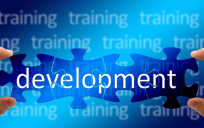Interesting article in the WSJ highlighting the contributions of small businesses.
WALL STREET JOURNAL — Crashing the White House Jobs Summit
Small Business Has Been Left Out of the Recovery, Maybe That’s Why There Are No Jobs
By DAVID WEIDNER Dec. 3, 2009
Michaele and Tareq Salahi shocked the nation last week, when they illustrated how alarmingly easy it may be to gate-crash the President’s home, but as small business owners they also accomplished something else few have been able to do: get attention from the White House.
Government aid to small businesses has lagged badly since the financial crisis began in earnest 20 months ago. In the 10 months since President Obama took office, his administration has worked hard through bailouts and incentives to preserve the advantage of big business interests, many times at the expense of small competitors.
That’s why as business and labor leaders gather Thursday at the White House, someone or something needs to crash the event and make a case for the nation’s small business community. Small businesses are the engine to any economic recovery. Now that we’ve stabilized the mammoth, but impotent, auto and financial industries, maybe it’s finally time for lifting up instead of propping up.
Two Standards
Consider that as Citigroup Inc. and General Motors Co. each received $50 billion in direct aid from the government.
Small businesses have received less than $400 million in new loans under the stimulus bill, as well as a handful of tax breaks and a program that buys up to $15 billion in securities tied to small business loans.
It’s true the Obama administration is pushing hard on a health-care plan that could benefit small businesses. Offering affordable health care could help small companies attract workers who couldn’t get health care on their own, but such a deal comes with a catch: employers will be forced to pay into the new system.
The bailouts have widened the divide of incentives given to big and small businesses, which wouldn’t be a problem if only the big businesses were the ones that fueled recovery.
They’re not, of course. Small businesses have generated 64% of all the new jobs created in the last 15 years and employ half of all U.S. workers, according to the Small Business Administration. Businesses with fewer than 500 employees create more than half the nonfarm goods and services produced in the U.S., excluding the government. They account for more than 30% of the nation’s exports.
The nation’s 29.6 million small businesses also drive the nation’s innovation. Small businesses produce 13 patents for every one patent generated by big corporations with research and development arms.
Small businesses do all that even though the game is stacked against them. For every six small businesses created in a year, five will close. Small businesses face higher costs. Banks charge them more. Landlords charge them more. And the government charges them much more. Government regulations cost small businesses $7,647 per employee, compared to $5,282 for big companies, according to a 2005 study by W. Mark Crain, an economics professor at Lafayette College in Easton, Pa., who was hired by the SBA to study the cost of regulation.
Two Economies
The evidence may be overwhelming, but it hasn’t influenced policy nearly enough even in the busy Obama administration. Actually, the opposite has been the case. The government’s decision to not bail out CIT Group Inc., a primary lender to small businesses has taken away a big source of small business financing.
Though the marketplace is showing signs it will absorb some of CIT’s loans, it’s not smaller lenders benefiting, but big, bailed out banks such as GE Capital, Bank of America Corp. and Citigroup taking up the slack.
The SBA has been in talks with the Treasury Department about using spare bailout funds to help small businesses, but no plan has emerged.
In the same way, while General Motors and Chrysler LLC were bailed out, start-up automakers such as Phoenix Motorcars, Electric City Motors, Aptera Motors — small companies with new ideas — aren’t getting the same level of support and may end up competing for federal dollars aimed at producing new technology.
Given Washington’s dismal record in picking winners and losers, it’s encouraging that President Obama is calling 130 experts to the White House to discuss the nation’s high unemployment rate, which stands at 10.2%, a 26-year high. Big Corporate America will be well represented. Top executives from AT&T Inc., Walt Disney Co. Google Inc. as well as labor leaders are participating.
The SBA along with other small business advocates and representatives have been invited too. They won’t have to crash the party. But will they leave smiling?
Write to David Weidner at [email protected]




Leave a Reply
You must be logged in to post a comment.